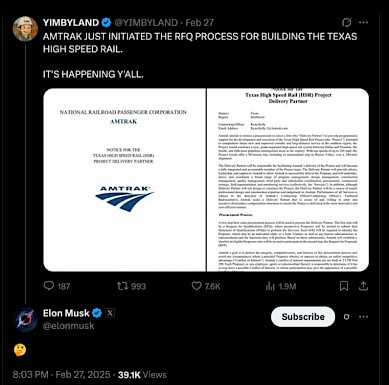Happening Now
Is Private Capital Up To The Texas High-Speed Challenge?
April 15, 2025
By Jim Mathews / President & CEO
There’s a cliché about an ancient curse that goes something like “May you live in interesting times.” For most of its history, the Texas Central high-speed rail project linking Houston and Dallas has had to live through “interesting times,” and the past 24 hours may prove to be among the most “interesting” it has had since its inception.
Yesterday, shortly after U.S. Transportation Secretary Sean Duffy announced he was pulling the project’s $63.9 million Corridor Identification Program grant because it was a “waste of taxpayer funds,” the project’s new private backer – John Kleinheinz, of venture fund Kleinheinz Capital Partners, which bought out the original Japanese investors’ share of the project – issued a statement agreeing with Duffy’s assessment and declaring the decision “good news for the overall project.”
“The first Trump Administration gave this project the green light, but after President Trump left office, the project got hung up in the politics of the Biden Administration's efforts to jam Amtrak and politics into the equation,” Kleinheinz said in a press statement. “We agree with Secretary Duffy that this project should be led by the private sector, and we will be proud to take it forward. This project is shovel-ready and will create significant new jobs and economic growth for Texas as part of President Trump's efforts to boost the U.S. economy.”
Nobody would be more pleased to see that happen than this Association. We have backed, steadfastly, just about any reasonable effort to bring true high-speed rail to the U.S., and that includes Texas Central. We supported the then-all-private Texas Central’s fights in the Texas court system against NIMBY opposition five years ago. We also testified before, and filed comments with, the Federal Railroad Administration supporting the FRA special operating exemption it sought (known as a Rule of Particular Applicability) based on lifting and shifting the entire Shinkansen operating model into the Texas project, and we filed at the Surface Transportation Board supporting the Texas Central plan to interline tickets with Amtrak services.
But here’s the thing. When Texas Central “won” its final court battle to be considered an actual railroad under Texas law, it was at best a pyrrhic victory because years of costly white-shoe litigation scared off the private capital needed to see the project through. If there’s one thing private capital demands, it’s low risk, clarity, and certainty. Endless rounds of high-dollar motion practice create just the opposite, and U.S. high-speed rail projects never seem to have either clarity or certainty.
The Biden Administration did not “jam Amtrak and politics into the equation.” Investors, primarily though not exclusively Japanese, realized that rail infrastructure decisions that would be solid anywhere else in the world can vanish in the U.S. at a whim. Capital fled the project and after a couple of dormant years, Amtrak was coaxed into assuming a leadership role to seek Federal grants and move it forward. Amtrak also hired arguably the world’s best expert at rescuing troubled rail programs, Britain’s Andy Byford, to take on the Texas high-speed challenge.
Look anywhere in the world at successful high-speed rail programs and you’ll find significant government investment in capital and backing. Japan’s Shinkansen enjoys government-built infrastructure, as does France’s TGV, the Italo in France, and China’s world-leading high-speed rail network. At its peak in the early 2010s, China was building more than 1,500 miles of new high-speed right-of-way every single year, and in the past two decades has spent between $1.3 trillion and $1.5 trillion since the early 2000s building high-speed rail using government money and absorbing risk that private capital simply can’t absorb.

The Rail Passengers Association supports many different forms of public-private ventures, which this Texas Central project was. But we hope that Duffy’s announcement isn’t an ideologically driven decision to turn it over to the “free market” and a prayer. Billionaire and Trump advisor Elon Musk’s interest six weeks ago in the announcement of a search for an operating contractor makes me at least have to ask the question.
For all our sakes, I truly wish Kleinheinz every success in getting this extremely worthy project finally moving. We’ll do everything we can as an Association to help him make real progress. Kleinheinz is not wrong when he says that this project is shovel-ready, that it will create significant new jobs, and that it will supercharge the Texas economy. We have said all of that and more, when it was private and then again when Amtrak became involved. But I still seriously doubt that private capital alone can do the job. It hasn’t done that anywhere else, and there’s no evidence that this project would prove to be the exception. This is one of those times that nobody will be happier than me to be proved wrong.
"I wish to extend my appreciation to members of the Rail Passengers Association for their steadfast advocacy to protect not only the Southwest Chief, but all rail transportation which plays such an important role in our economy and local communities. I look forward to continuing this close partnership, both with America’s rail passengers and our bipartisan group of senators, to ensure a bright future for the Southwest Chief route."
Senator Jerry Moran (R-KS)
April 2, 2019, on receiving the Association's Golden Spike Award for his work to protect the Southwest Chief
Comments